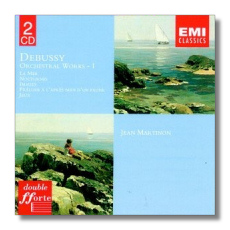
The Internet's Premier Classical Music Source
Related Links
- Debussy Reviews
- Latest Reviews
- More Reviews
-
By Composer
-
Collections
DVD & Blu-ray
Books
Concert Reviews
Articles/Interviews
Software
Audio
Search Amazon
Recommended Links
Site News
 CD Review
CD Review
Claude Debussy

Orchestral Works
- Disc One:
- La Mer
- Three Nocturnes
- Prélude to the Afternoon of a Faun
- Marche ecossaise
- Berceuse héro´que
- Musiques pour Le Roi Lear
- Disc Two:
- Jeux
- Images
- Printemps
Orchestre National de L'O.R.T.F./Jean Martinon
EMI Forte 72667


- Disc One:
- Children's Corner
- Petite Suite (orch. Busser)
- Dances Sacred and Profane
- Le Boite a joujoux
- Disc Two:
- Fantasie for Piano and Orchestra
- La plus que lente
- première Rapsodie for clarinet
- Rapsodie (for saxophone)
- Khamma
- Danse (orch. Ravel)
Orchestre National de L'O.R.T.F./Jean Martinon
EMI Forte 72673
There are some classical compositions that inherently demand that you have more than one recording in your collection. Debussy's "La Mer" is one of them. So are his Nocturnes. I am going to be spending a lot of this article talking about "La Mer" in particular, especially comparing different interpretations and recordings. It may get a bit tedious. So, let me say at the outset that these discs will offer the listener excellent recordings that are warm but still with detail. Jean Martinon is one of those conductors who is not so well known as he should be. Especially in his Debussy and Ravel he brings out some marvelous playing and interpretations. In short, these recordings should be in the collection of every lover of the music of Debussy, even if it means some duplication. Not only that, the price is right.
If I had to live with only one "La Mer"… no, that way lies madness. I would not want to be without any of the recordings discussed below. I want to be able to pull them from the shelf and consider them whenever the mood strikes me. In some cases, like this one, it is wonderful to be able to get them all out and compare them and learn more about the music in the process.
I have arbitrarily decided to focus the discussion to "De l'aube a midi sur la mer". In fact, I am going to further limit the discussion to two defining moments of the piece, the very opening and the final denouement. How the conductor handles these two moments is crucial to the overall picture of the whole piece. If these moments are captured properly the whole thing is usually done well. To my ears the opening needs to have a firm, clear and deep bass line. You must be able to feel it even before you are aware that you hear it. Towards the close the sun shimmers on the surface of the sea before rushing towards a crashing conclusion. Between those two moments the conductor needs to grasp the irregular ebb and flow of the sea in the music itself.
I have a theory I inflict upon anyone willing to listen. It is related to contextual knowledge as it is applied to making music. Put simply, a conductor who has sailed the sea or ocean will likely impart a sense of the ebb and flow of the sea into the music. A conductor who has merely flown over these bodies of water will not have the same ability to impart this sensation. Not every conductor who has sailed will necessarily impart this irregular regularity, but a conductor who has not sailed the sea will not have felt what it sounds like.
My first recording of "La Mer" was by Solti. I got the LP as one of the first 10 classical discs I bought when I decided to get serious about that genre. I remember thinking that the music was better than what I was hearing. I cast about for awhile before I was able to find the "La Mer" that first appealed to my ears. To be honest, I no longer recall exactly which recording did it for me, but I know it was one of the ones mentioned below.
Martinon's "La Mer" is among the finest on disc. His first movement clocks in at 9:09 and the comparative timings of the selected recordings are really an indication of how timing is not everything. Martinon maintains tension even though he is among the slower of the recordings. On some days it is my favorite. The opening is felt as it emerges. The flow is as erratic as it should be. The sparkle of the sun on the sea before the climax is the finest anyone has done. The harps shimmer over the music like no one else's interpretation. As I said before, the sound on all of these discs adds to the atmosphere of the music making.
Anyone who loves this music really must hear Pierre Monteux's recording with the Boston Symphony Orchestra. He is faster than Martinon, taking 30 seconds less. It is monaural, but was made in the early fifties, so you don't have to contend with the sonic limitations of 78s. There is an almost chamber music like quality to the textures. In this "mer" you can smell the salty water and decay of dead fish in the morning air. The music swells and then dips like the sea, swirling about you. The tension Monteux builds before the climax at the end of the first movement is visceral in its intensity. This disc (9026-61890) is one of many indispensable items in the Monteux Collection issued by RCA. I am listening to it as I type these words.
Then there is Stokowski whose timing, 9:46, would seem impossibly slow. Not so. Stokowski's "mer" is colder than the others. This is the Baltic Sea. Stokowski crossed the oceans many times in his life, always on ship. (A dangerous plane landing he was involved in during the 40s convinced The Maestro that ship was his preferred form of travel.) In fact, Stokowski's "mer" is more like an ocean. The Phase 4 recording (455-152) provides some delicious solos. The closing moments bring the double basses and cellos together in a riveting performance that swells to a shattering conclusion.
In the next category are two recordings I like a lot, but they are not my first choices. Barbirolli's recording is on Royal Classics 701172. It has powerful moments, but at 10:31 it does ebb too much at moments. Charles Munch's recording on RCA 9026-61500 is wonderful. At 8:33 he is close to Monteux and has the same Boston Symphony Orchestra in stereo. I have to confess that I have heard a live recording of Munch that I prefer, unfortunately I cannot locate the tape and forget the orchestra. If this RCA recording does not quite move me the way the others do, it is still an excellent recording and is coupled with the finest Saint-Saëns Third Symphony ever put on disc. Another recording I like a lot is Ansermet's who takes a mere 8:13 in the first movement. It is a good recording but it is beginning to sound a bit dated and the strings are a bit thin.
At the bottom are two recordings I do not recommend. Haitink on a two-fer Philips set used to impress me. Recent listenings, in comparison with those above, however, have led me to conclude that Haitink is just a little too faceless. The "Das Mer" of Karajan baffles me. I say that because so many writers hold it in such high esteem but I cannot figure out why. It reminds me of the story of two hillbillies looking at the sea. One turns to the other and says, "Sure is a lot of water." The other hillbilly replies, "Yep, and that's just the top." Karajan never seems to get below the surface.
Okay, I warned you I would spend a lot of time talking about but one of the items on the EMI releases. Let me turn to the others. Martinon's Nocturnes and Ibéria may not be as atmospheric as Stokowski's [EMI 2435-65422] but they are in the same class. The same can be said of the rest of the menu. All of the performances are excellent. This set is a first class way to add Debussy to your collection whether you have other recordings or not.
After putting some finishing touches on this review, I sat back and just enjoyed the disc with Martinon's "La Mer". Throughout the recording Maestro Martinon maintains tension and flow. The conclusion of the "Dialogue" is so tense that I didn't realize how strong it was until it was over and I breathed a sigh as my shoulders relaxed. Good stuff.
Copyright © 1998, Robert Stumpf II


















